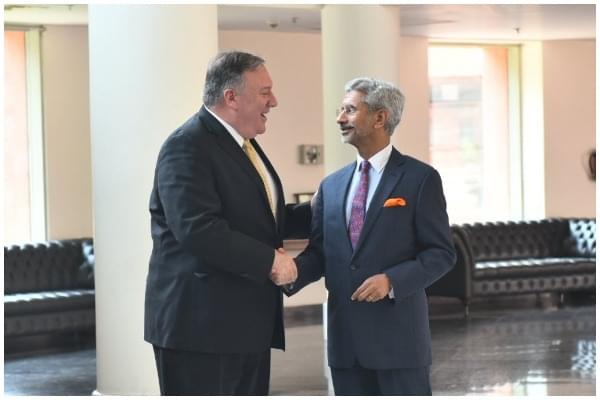World
As US-China Cold War Intensifies Over Hong-Kong, India May Have To Choose Between Post-Colonial Solidarity And Realism
Yaajnaseni
Jun 02, 2020, 11:16 AM | Updated 11:16 AM IST
Save & read from anywhere!
Bookmark stories for easy access on any device or the Swarajya app.


Hong Kong is increasingly becoming a symbol of the intensifying cold war between United States and China.
In 1997, after 150 years of colonial rule, Britain signed a treaty with China to exit Hong Kong in lieu of 'one country two systems’ principle. The arrangement was to last till 2047.
UK had a face-saving exit and China got half a century’s time to pursue national integration. The deal seemed impeccable.
However, the protests in Hong Kong since last year have shown that the process is not going to be as painless as assumed.
Recently, China’s bid to bring a new national security law triggered fresh protests in Hong Kong.
The law would make criminal inter alia any act of supporting Hong Kong’s break-away from China, undermining the authority of Chinese government, and the interference of foreign powers.
Reportedly, China was unable to push the legislation through the Hong Kong legislature, and therefore, has now taken direct charge. The new laws are being touted as the last nail in the coffin for ‘one country two systems’.
Thousands of protesters were again on the streets on 24 May to oppose the law, chanting slogans for “liberation” of Hong Kong from the China. Within an hour of the start of the march, the police fired tear gas at the crowds.
On the other hand, US announced plans to withdraw the special privileges of Hong Kong as a distinct and autonomous Chinese region.
China shot back at US after violent protests erupted over the death of an unarmed black man during arrest.
"US House Speaker Nancy Pelosi once called the violent protests in Hong Kong 'a beautiful sight to behold'. “US politicians now can enjoy this sight from their own windows," Hu Xijin, editor-in-chief of nationalist tabloid Global Times said on Saturday.
The Chinese media also circulated video clips suggesting Hong Kong police were "restrained" in comparison to the US police.
Pro-democracy versus neo-imperialism
The West has raised the issue of Hong Kong as that of autonomy, respect for the 1997 UK-China agreement on ‘one country two systems’, and democracy.
While China possesses economic and military power, soft power isn’t its forte.
In global politics, the country has a reputation of an aggressive bully, and is also facing pushback from the developing countries for its debt-trap diplomacy.
China’s signature One Belt One Road initiative, arguably an attempt to build Pax Sinica over Asia with itself as the policeman, is also in trouble due to China’s slowing economic growth as well as the COVID-19 pandemic.
China’s communism has always been compared with USSR’s, and the former is praised for being more pragmatic.
Unlike USSR, China decided to embrace market reforms, but didn’t accompany them with political and governance reforms — a key factor behind the fall of the USSR.
In foreign policy domain, China didn’t make export of communism a key factor unlike USSR. The foreign policy statements of China never refer to spread of communism as a goal and rarely use ideologically informed language — something that made the 1971 US-China rapprochement and subsequent integration with global economy easier.
While this pragmatism with regards to communism paid-off in terms of fast economic growth, a seat in UN Security Council replacing Taiwan, membership of WTO etc., it also poses a challenge for China.
The Cold War between US and the Soviet Union could remain “cold” because the fight was seen as primarily ideological — capitalism versus communism.
This gentleman’s spat played out more aggressively in the Third World where both countries financed factions closer to their own ideology, supplied them arms and ammunition. The subsequent violence cost many lives, be it Korea or Vietnam.
The question is, if a cold war was to happen between US and China, what would be China’s ground? What ideas does China stand for that it claims are superior to that of the US?
This ideological vacuum is also the reason behind the directly aggressive, bullying and threatening language of China — it only has violence as a response, hence zero soft power.
While China has tried to push its civilisational legacy, especially Confucianism, to build soft power, the attempt was mostly a failure. How could Chinese civilisational thought gain more admirers overseas when internally China bulldozed Communism over the "old customs, old culture, old habits, old ideas"?
Also read: For Hong Kong, Communist Ideology Imposed By China Is As Foreign As The British Colonial Ideology
This ideological vacuum suggests that one, China would find itself increasingly isolated in the global domain, and two, if it intensifies, US-China Cold War could quickly turn hot.
The threat to China is real, given that almost 60 per cent of its territory is facing secessionist threat of one kind or another. China is facing resistance movements in Tibet, Xinjiang and Southern Mongolia. Hong Kong and Taiwan too remains a concern for Beijing.
On top of this, China is experiencing a slowing economy.
In response to the West raising the issue of Hong Kong, China has retorted with charges of neo-imperialism.
The Hong Kong protests displayed broad-based and widespread usage of colonial symbols, displaying a sense of nostalgia, or what China calls, “fantasising the faded glory of British colonialism".
Beijing has insisted that the Hong Kong protests are carried out by “rioters” on the behest of "foreign forces".
Last year, when London came out in support of the protesters and asked Beijing to honour the 1997 agreements, China called the attempt 'shameless' and asked Britain to keep its 'colonial' hands off Hong Kong.
It had made similar comments about US.
China can very well turn to decolonisation movement and critique of neo-imperialism in its fight to integrate Hong Kong with the mainland.
However, it cannot do so without recognising, one, how it has itself displayed imperial arrogance and bullied smaller nations like Vietnam, occupied Tibet etc., and two, what are the factors behind its failure to upturn colonial legacy in Hong Kong.
Beijing will have to take responsibility in why the Hong Kongers, decades after the colonial rule, are saying 'Make Hong Kong Great Britain Again’ and waiving the Union Jack.
India’s options
The intensifying US-China cold war presents both opportunities and challenges for India.
US Secretary of State Michael Pompeo said on Sunday (31 May) that the US could partner with several nations across the globe including India to counter the threat posed by Chinese military.
A smart China would soften its posture towards India to gain a strong post-colonial nation as its ally on the Hong Kong issue. A rattled China will immaturely up the ante on India-China border, flexing its muscles in a bid to scare away the enemies.
The key for India is to keep its options open, and not continue with the one-sided support to ‘One China’ as it has done in the past.
Current external affairs minister S Jaishankar rightly criticised the past ‘Delhi Dogmas’ in terms of foreign policy and showed a willingness to enter the real world of convergences.
India can neither let itself become a battleground for proxy-war against China, suffering huge domestic costs like Pakistan did, nor it can silently sit and take Chinese bullying.
With a pragmatic approach, India can come up with a functional and beneficial partnership with both US and China, and even emerge as a mediator.
In any case, India needs to be watchful, prepared, and in a dynamic, quick-response posture.
In the event of US-China war turning ‘hot’, India is likely to be the first to face the heat from a China trying to send a message about what it is capable of. The 1962 War was a similar message-sending exercise, and so is the ongoing India-China stand-off in eastern Ladakh.
Also, pragmatism doesn’t mean complete divorce from principles. Pragmatism involves reciprocity, exuding a clarity of vision and expectations, making some core expectations non-negotiable, and robust diplomacy.
In fact, one lesson from the China-Hong Kong episode for India is that short-term tactical success resulting in a lack of soft-power and ideological vacuum in the long-term is dangerous.
Also read: As China Seeks Support On Hong Kong, India Has The Opportunity To Revive Relations On New Terms
A 25-year-old IIT alumna with deep interest in society, culture and politics, she describes herself as a humble seeker of Sanatana wisdom that has graced Bharatvarsha in different ways, forms and languages. Follow her @yaajnaseni





